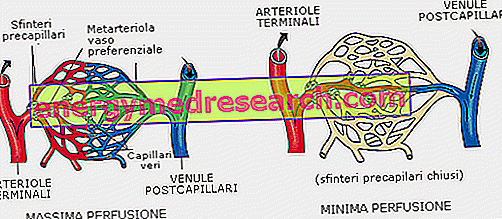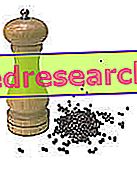Generality
Natural anxiolytics are substances of non-synthetic origin capable of exercising anxiolytic, sedative and calming activities .
In many cases, these natural anxiolytics can be found inside food supplements, the purchase of which can be made freely, without the obligation to present the medical prescription. However, this does not mean that natural anxiolytics can be used by anyone in any condition. This is why it is always necessary to consult a doctor first .
Furthermore, natural anxiolytics can prove to be useful aids in the presence of anxiety disorders, but only in milder cases; while for severe cases, it is essential to resort to adequate medical and pharmacological treatments.
Please note
Food supplements based on natural anxiolytics should not be considered as substitutes for an anxiolytic drug therapy. In fact, as stated above, natural anxiolytics can only be useful in minor cases, they are not drugs and can not cure pathological anxiety .
Therefore, we reiterate the importance of contacting your doctor before resorting to the use of similar remedies.
Hawthorn
Hawthorn ( Crataegus oxyacantha ) is a plant that has been attributed anxiolytic properties since ancient times.

These properties are mainly attributed to the anthocyanidins contained in the plant, but also the flavonoids seem to be involved in the sedative action traditionally ascribed to hawthorn.
Hawthorn, therefore, is used as a natural anxiolytic and as a remedy for stress-induced sleep disorders and anxiety .
Hawthorn can be found in various dietary supplements, especially in association with other plants with similar anxiolytic activities. However, it can also be found on its own, especially as hawthorn drops.
Did you know that ...
Hawthorn is also used to counteract mild hypertensive states as it has hypotensive, vasodilatory and cardiotonic properties.
Possible Pharmacological Interactions
Due to its properties, hawthorn and its derivatives can establish drug interactions with antiarrhythmic drugs, cardioactive glycosides, platelet aggregation inhibitors and cisapride.
Side effects
Usually, hawthorn is a well tolerated natural anxiolytic, however, in some cases its intake could cause tachycardia, palpitations, headaches, gastrointestinal disorders, dizziness and hot flushes.
Contraindications
The intake of hawthorn is contraindicated in case of allergy to the same hawthorn, in the pediatric age and during the first trimester of pregnancy.
Escolzia
Esculzia ( Eschscholtzia californica ) is a plant capable of exerting a sedative and anxiolytic action on the central nervous system. These activities are mainly attributable to the alkaloids contained in the plant and, in particular, to californidina .

Scolzia and its extracts are often used in association with other natural anxiolytics, such as, for example, hawthorn.
Possible Pharmacological Interactions
Scolzia and its derivatives could interfere with the activity of monoamine oxidase inhibitors and the activity of barbiturates.
Contraindications
The use of excolice is contraindicated in case of allergy to the same plant and during pregnancy and lactation.
hypericum
St. John's Wort ( Hypericum perforatum ) - also known as St. John's Wort - is a known natural antidepressant that also has interesting anxiolytic properties.

These properties are exercised by the combination of substances contained in the plant, such as hyperforin, hypericin, pseudohypericin, amentoflavone and rutin.
Anxiolytic action is exercised above all through the inhibition of GABA reuptake and the modulation of the transmission of other neurotransmitters such as serotonin, dopamine and noradrenaline.
Possible Pharmacological Interactions
Because of the mechanisms of action with which hypericum and its extracts exert antidepressant and anxiolytic activity, they are able to interfere with the action of different drugs and substances, such as:
- Other antidepressant drugs;
- Oral anticoagulants;
- immunosuppressant;
- Anti-cancer drugs;
- anticonvulsants;
- antiarrhythmics;
- Antibiotics;
- Antivirals;
- Beta-blocking drugs;
- Hypoglycemic;
- Antihypertensive and antianginal drugs;
- Contraceptives and other estrogen-based drugs;
- Theophylline;
- Caffeine;
- Foods containing tyramine.
Side effects
Following the consumption of hypericum or its derivatives, undesirable effects such as:
- Gastrointestinal disorders;
- Photosensitivity reactions;
- Headache;
- Fatigue;
- Restlessness;
- Hypertensive crisis;
- Increased frequency of urination.
Contraindications
Hypericum and its derivatives should not be used in case of hypersensitivity to the plant, during pregnancy and during lactation.
Kava Kava
Kava kava ( Piper methysticum ) is a plant with anxiolytic, antispasmodic and anticonvulsant properties.
The anxiolytic activity has been confirmed by several studies conducted on the subject, for this reason, the use of plant extracts for the treatment of anxiety and stress has been approved by the German Commission.
The mechanism of action by which kava kava has become part of the natural anxiolytic group is not yet completely clear, but undoubtedly there is the involvement of lactones and flavonoids contained in it.
Possible Pharmacological Interactions
Kava kava and its derivatives can interfere with the activity of drugs, such as:
- Anxiolytic drugs;
- Anticoagulants and antiplatelet agents;
- Low molecular weight heparins;
- Thrombolytic drugs;
- Amantadine;
- bromocriptine;
- muscle relaxants;
- Opioid analgesics;
- Phenothiazines and drugs that act on dopaminergic transmission;
- Monoamine oxidase inhibitors.
Side effects
The long-term intake of kava kava could promote the appearance of skin discolouration, migraine, visual disturbances and gastrointestinal disorders.
Melissa
Lemon balm ( Melissa officinalis ) is a plant with proven sedative activity and, therefore, is often used to counteract states of agitation and insomnia, but not only. Lemon balm, in fact, is able to counteract the anxiety that accompanies visceral somatizations . It is this activity that has allowed the lemon balm to re-enter the great group of natural anxiolytics.
More in detail, the sedative action and anxiolytic activity seem to be exercised through the inhibition of GABA-transaminase .
Possible Pharmacological Interactions
Lemon balm and its derivatives could interfere with the activity of barbiturates.
Furthermore, the combination of lemon balm with other natural anxiolytics, such as hypericum and passion flower, can cause undesirable sedative effects.
passionflower
The passionflower ( Passiflora incarnata ) is a renowned natural anxiolytic, used mostly to counteract the anxiety syndromes characterized by insomnia and restlessness .

The sedative and anxiolytic properties of the passion flower are due to its flavonoid content and the use of the plant and its extracts for the treatment of this type of anxiety disorder has been officially approved by the German Commission.
Possible Pharmacological Interactions
Passion flower and its derivatives could interfere with the action of sedative-hypnotic drugs and coumarin anticoagulants.
Side effects
Excessive sedation and drowsiness may occur following the intake of passion flower.
Contraindications
The use of passionflower is contraindicated in case of known hypersensitivity to the plant, in pediatric age and during pregnancy.
Valerian
Valerian ( Valeriana officinalis ) is one of the best known natural anxiolytics. In particular, valerian can be used in the complementary therapy of particular types of anxiety manifestations, such as anxiety crisis, panic attacks, nervous tension, etc.
In detail, the anxiolytic action of valerian seems to be attributable to the valepotriati, to the valerenic acid and to the valerenal contained in it. In fact, these compounds seem to be able to interfere with the degradation of GABA .
Possible Pharmacological Interactions
Valerian and its derivatives can establish drug interactions with various types of drugs, such as:
- Barbiturates and benzodiazepines;
- Opioid analgesics;
- Medicinal plants and hepatotoxic drugs;
- Antidepressants;
- Antihistamines;
- loperamide;
- Iron.
Side effects
Taking valerian could cause gastrointestinal disorders, headaches, agitation and sleep disturbances (these latter effects may occur following prolonged use).
Contraindications
The use of valerian or its derivatives is contraindicated in case of known hypersensitivity to the same plant, in patients suffering from liver diseases, in children and adolescents less than 14 years old, during pregnancy and during lactation.
Other Natural Anxiolytics
Natural anxiolytics can also include products belonging to what are called alternative medicines, such as homeopathy and Bach flower therapy . Furthermore, even some essential oils are used in the aromatherapy field as natural anxiolytics to combat stress and anxiety.
Homeopathy
The homeopathic remedies that can be used to fight anxiety are different, each of which can be useful to counteract different types of anxiety states. Among the natural anxiolytics proposed by homeopathy, we recall:
- Lilium tigrinum : is a homeopathic remedy useful to counteract anxiety and agitation associated with weakness .
- Aconitum napellus : homeopathic remedy used in case of anxiety, agitation and restlessness .
- Ignatia amara : used to counteract anxiety, neurosis and excessive emotionality .
- Argentum nitricum : is a homeopathic remedy of mineral origin that is used in particular to counteract pre-exam anxiety and restless sleep .
- Hawthorn : in addition to phytotherapy, hawthorn is also used in the homeopathic field to counteract feelings of anxiety and stress .
Bach flower therapy
To counteract anxiety, Bach flower therapy uses natural anxiolytics different from the usual. In fact, it exploits the extracts obtained from flower petals considered able to exert anxiolytic properties. These include:
- Mimulus guttatus (yellow mimulus);
- Ceratostigma willmottiana (waxed);
- Populus tremula (aspen);
- Castanea sativa (sweet chestnut).
Aromatherapy
Finally, to combat anxiety, even aromatherapy is able to propose some natural anxiolytics. More precisely, aromatherapy exploits the action of essential oils and the activity that the volatile molecules contained in them can exert on the central nervous system through smell.
Therefore, to combat anxiety states, aromatherapy uses the use of essences capable of reducing stress and agitation, such as, for example, lavender essential oil and essential oil of lemon balm .
Please note
The practices described here are not accepted by medical science, they have not been subjected to experimental tests conducted with a scientific method or have not passed them, so these practices could be ineffective or even be dangerous to health.
The information given is for illustrative purposes only.
Pregnancy and breastfeeding
Can Natural Anxiolytics be used in Pregnancy and Breastfeeding?
In principle, as a precautionary measure, the use of natural anxiolytics during pregnancy and lactation is not recommended. Furthermore, in some cases, the use of natural anxiolytics during pregnancy and lactation is explicitly contraindicated.
For this reason, in cases of anxiety, pregnant women and breastfeeding mothers should always seek the advice of their doctor before taking natural drugs or anxiolytics of any kind.



